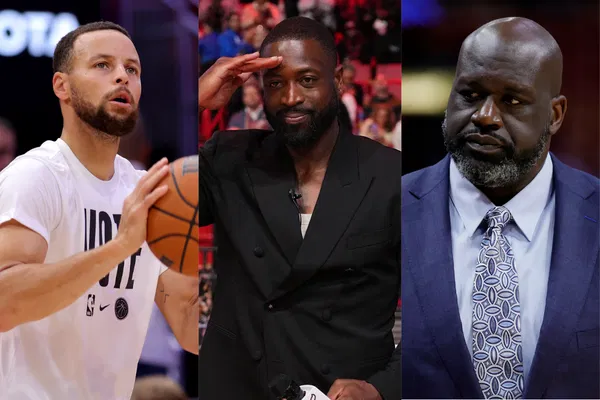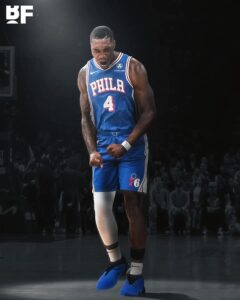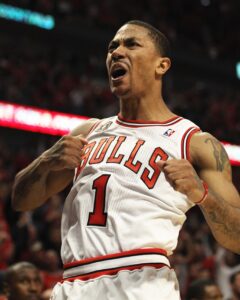
After Facing Criticism, Dwyane Wade Fires Back at Shaquille O’Neal With Stephen Curry ‘Replacement’ Warning
In the world of sports, debates are as inevitable as the final buzzer. Former Miami Heat stars Dwyane Wade and Shaquille O’Neal have recently reignited an old rivalry—not in the paint, but with words. After Shaquille O’Neal publicly criticized Wade’s status among the greatest guards in NBA history, Wade hit back in a way that has sent ripples through NBA fandom, issuing a Stephen Curry-centered “replacement” warning to Shaq. Wade’s response suggests that the NBA landscape is evolving quickly, with new stars ready to claim top spots in the league’s hierarchy. The feud may reveal more than just personal jabs; it hints at a deep-rooted tension between basketball’s old guard and the new generation.
Shaq’s Criticism: A Blunt but Familiar Stance
Shaquille O’Neal, known for his no-holds-barred commentary as an analyst on TNT’s Inside the NBA, hasn’t shied away from offering sharp critiques of former teammates. Most recently, Shaq sparked controversy by dismissing Dwyane Wade’s claim to an all-time elite position among shooting guards. Shaq reportedly argued that Wade’s accomplishments, while impressive, pale in comparison to legends like Michael Jordan and Kobe Bryant. He went on to imply that Wade’s success was partly due to his time with the 2006 Heat—specifically, during the title run where Shaq himself was instrumental.
Shaq’s take isn’t entirely new; he has often underscored his role in the 2006 championship, claiming Wade’s early success would have been impossible without his veteran presence. But fans and analysts have pointed out that Wade, who carried the Heat through a historic NBA Finals comeback against the Dallas Mavericks, displayed a talent and leadership level that earned him the Finals MVP and cemented his place among the game’s greatest. Shaq’s comments, then, feel less like impartial analysis and more like an attempt to diminish a teammate who once shared his spotlight.
Wade’s Fiery Response: Stephen Curry as the “Replacement” Guard
Wade wasn’t one to stay silent. In response, he issued what can only be described as a “replacement” warning, invoking the name of Stephen Curry—a player who, arguably, could challenge the legacies of both Wade and Shaq in his own right. Wade suggested that Curry’s dominance and impact on the modern game have shifted the criteria by which all-time great guards are judged. Essentially, Wade hinted that Curry is the new standard, potentially surpassing or even “replacing” the accomplishments of past shooting guards like himself, Bryant, and Allen Iverson.
This response was more than a defense of his own legacy; it was an assertion that the NBA’s elite guard tier is evolving, and Shaq’s comparisons are becoming outdated. By citing Curry, a player known for revolutionizing the game with his shooting and winning multiple championships, Wade appeared to be making a larger point: the NBA’s historical guard rankings are no longer static. Wade’s warning was clear—Curry’s influence is rewriting the narrative, and nostalgia-driven criticisms may not hold up in today’s game.
The Shaq vs. Wade Feud: A Look at Ego and Legacy
The feud between Wade and Shaq highlights an uncomfortable truth about sports: for many athletes, legacy isn’t merely about numbers on a scoreboard; it’s a matter of pride and identity. Shaquille O’Neal has long been a towering figure in basketball history, and his dominance during the early 2000s set the bar high for big men. However, his habit of diminishing former teammates’ accomplishments—whether Wade, Bryant, or Penny Hardaway—has often come across as a way to maintain his own legacy by subtly downplaying those of others.
Wade’s response reflects the frustration of an athlete whose hard-earned achievements are being minimized by a former teammate. While it’s easy to see this as just another celebrity spat, it raises a critical question about legacy: does an older player have the right to dictate the hierarchy of greatness, or should they gracefully step aside as new players like Curry reshape the game?
Curry’s Role in Redefining NBA History
Wade’s mention of Curry is significant not just as a way to irritate Shaq but as a statement on the NBA’s shifting dynamics. Curry’s career has pushed the boundaries of what a guard can do, transforming the three-point shot into a primary offensive weapon. This has prompted debates over whether he, rather than the shooting guards and wings of the past, deserves the top spot among guards. Unlike Jordan or Kobe, Curry’s game isn’t centered around mid-range shots, dunks, or isolation moves; instead, he has succeeded through range, precision, and high basketball IQ.
This new style has, in many ways, left traditionalists like Shaq struggling to adapt. To some, Curry represents the dilution of the game, prioritizing finesse over physicality. To others, he is an evolution, a player who has reshaped the game for the better. By warning Shaq of Curry’s rising status, Wade underscored that this new era—dominated by finesse and skill over power—might soon leave Shaq’s archetype of dominance behind.
The Real Issue: Generational Shifts and the Reluctance to Move On
Beneath the verbal jabs and legacy disputes lies a broader generational divide in the NBA. Players like Shaq often embody a mindset shaped by a different basketball era, one where physicality was paramount, and players measured greatness through the traditional metrics of points and titles. In contrast, today’s players value versatility, adaptability, and influence—qualities that Curry exemplifies. Wade’s response highlights how the NBA’s legacy hierarchy is in flux, with younger players challenging the old guard’s criteria for greatness.
By suggesting that Shaq’s views may be dated, Wade wasn’t just defending himself; he was advocating for a more inclusive understanding of greatness—one that celebrates different styles and the modern evolution of the game.
Conclusion: Is the Game Leaving Shaq Behind?
Wade’s “replacement” warning may be a signal of where the NBA is headed. As the league continues to change, so too does its perception of greatness. Shaquille O’Neal’s criticism, rooted in a bygone era of basketball, may find itself increasingly out of touch with how younger fans and players perceive the sport.
Ultimately, Wade’s response and Curry’s ascent serve as a reminder that basketball, like any art form, evolves. And while Shaq’s dominance will never be forgotten, his critiques may have less impact on a league increasingly defined by players like Curry who have redefined the path to greatness.






